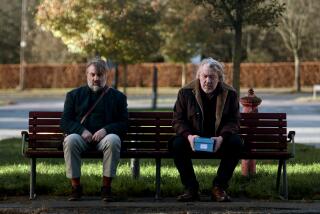Facing death alone
- Share via
Although “My Life Without Me” frequently moves audiences to tears, Spanish director Isabel Coixet is frustrated when people label her English-language film a tear-jerker.
“Don’t say that!” she says, cringing. “I think it’s a little dismissive, like, ‘Oh, this one is a tear-jerker.’ ” Her film isn’t sentimental or manipulative, Coixet asserts, unlike many Hollywood films about dying young.
Sarah Polley, who plays Ann, the film’s 23-year-old heroine who is diagnosed with terminal cancer, agrees.
“I think that movies that are there just to evoke emotion from you are sort of unuseful in some ways,” Polley says. “They’re unhelpful.” This one has “a lot of other layers and dimensions to it than just trying to squeeze tears from the audience.”
In “My Life Without Me,” Ann makes a decision not to tell those close to her, not even her mother (Deborah Harry), husband (Scott Speedman) or two young daughters, about her illness, wanting them to remember her for how she lived rather than for slowly dying in a hospital bed. Ann writes out a partly pragmatic, partly indulgent list of 10 “Things to Do Before I Die,” which includes: telling her daughters she loves them every day; surreptitiously finding a new wife for her husband; making love to another man, just to see what it’s like; and recording audiotapes for her children for their future birthdays.
“I think that what she does is so amazing and so brave and so strong,” Polley says of her character’s decision. “I don’t think it would be the right thing in my life to not tell anyone,” Polley says of her character’s decision, “but it’s the right thing in the context of her life and the people in it to spare them that.”
“I think it’s a good thing,” Coixet adds. “Especially in North America, there is this obsession of sharing, saying your thoughts, ‘tell me what you’re thinking’ and all that. And I think sometimes it’s good, but not always. I have the impression sometimes you have to just deal with your suffering, deal with your pain without any help from the outside.”
Although she hopes she would have the courage to make the same choice Ann does, Coixet, 43, says she doesn’t know if she could. But “the film is not a documentary. It’s a fairy tale in a way, a dark fairy tale.”
“My Life Without Me” is based on the title story of Nanci Kincaid’s collection of short stories, “Pretending the Bed Is a Raft,” which Coixet came across in a bookstore while looking for a Milan Kundera novel on the same shelf. In the short story, however, the main character tells everyone around her that she’s dying.
“I remember one day I thought, ‘OK, what if she doesn’t tell anyone?’ ” Coixet says. “And I thought then there was a very interesting film there.... I thought you can make a film about life, not a film about death.” Writing the screenplay, Coixet made other changes as well, shifting the setting from the Deep South of Lousiana to the rainy cold of Vancouver, British Columbia, and adding a host of quirky supporting characters, including a hairdresser devoted to Milli Vanilli (Maria de Medeiros) and a janitor co-worker preoccupied with her weight (Amanda Plummer).
“All those little characters are just people obsessed about very stupid things,” Coixet says. “But we all are obsessed about stupid things, and meanwhile life is passing us by.”
Coixet, who also worked as the film’s camera operator, looked at dozens of actresses for the demanding role of Ann. She then sent the script to Polley, whose work she admired in films like “The Sweet Hereafter” and “The Claim.” “There is something very raw and very honest with her,” Coixet says. Polley adds, “The character never fell into pitying herself or wallowing, and there are no histrionics.”
“My Life Without Me” was shot on a $2-million budget over five weeks near Vancouver. Although Coixet hasn’t lost anyone close to her in her life, she says that death and the way to die well have weighed on her mind since she was a kid. “The ironic thing is, two weeks after the film was released in Spain, my father had a brain tumor, and when he was beginning to recover, my brother had colon cancer. He’s still in the hospital and he is in post-operation, and they were very brave and they were making jokes and telling me, ‘We are not brave enough’ ” to keep quiet.
The film’s themes struck Mark Ruffalo, who plays Lee, the wounded soul whom Ann takes as a lover. “My Life Without Me” was Ruffalo’s first film following an operation to remove a benign tumor in his brain. When Ruffalo received the diagnosis, he waited 10 days to tell his pregnant wife, after she had the baby, not wanting to spoil the happiness of the birth. Others he didn’t tell until he had recovered.
“I think it’s a common sort of experience,” he says. “When you find out you’re ill, the next question is, Who am I going to tell? When am I going to tell them? And why am I going to tell them?”
Coixet, who sports wide-rimmed purple glasses, resides in Barcelona, where she was born and where she fell in love with movies as a child. “I come from a very poor family. My grandmother was working in a movie theater taking tickets and my parents were working all the time, so I was alone with her watching films again and again.” At 18, Coixet wrote an article for the film magazine Fotogramas, which led to a job making commercials for an advertising agency.
Her films include the 1996 English-language film “Things I Never Told You” with Lili Taylor and 1998’s “A Los Que Aman” (Those Who Love), a period romance in French and Spanish with Monica Bellucci. Coixet is still deciding on her next project, but she recently completed a documentary for France’s Canal Plus network titled “A Journey to the Heart of Torture,” about rehabilitation centers for international torture victims.
“My Life Without Me” has screened at numerous festivals, including Berlin and Toronto, and has been playing in Spain since March. Terminal illness groups have been contacting Coixet, sending her their own before-I-die to-do lists.
Coixet has been overwhelmed by the response from audience members, who often want to share their stories.
“They are almost the same stories, and I realized it’s something very universal, and sometimes I wish I can be more helpful, but I think the film is really helpful in a way, very cathartic,” she says.
Polley says her husband sobbed when they watched the film together, and Coixet admits to crying herself while working on the DVD recently in Los Angeles. “I was like, ‘Man, I have watched this thing a thousand times. Why am I crying?’ ”
More to Read
Only good movies
Get the Indie Focus newsletter, Mark Olsen's weekly guide to the world of cinema.
You may occasionally receive promotional content from the Los Angeles Times.










